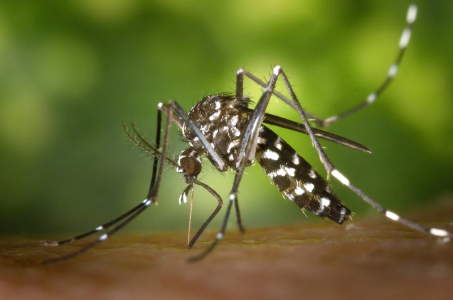‘Take precautions’: Experts are sounding the alarm as deadly virus resurfaces
By
Maan
- Replies 4
Mosquito-borne diseases are a constant concern in Australia, but new developments have put health authorities on high alert.
A recent discovery in Queensland has sparked fresh warnings, underscoring the risks that come with rising mosquito activity.
Now, experts are urging the public to take precautions as they monitor the unfolding situation.
A deadly mosquito-borne virus that could infect humans was detected at two pig farms in Queensland, raising fresh concerns among health authorities.
Biosecurity Queensland confirmed the presence of Japanese encephalitis virus (JEV) in southern Queensland on 13 February, marking the first detections in animals since July 2022.
Authorities did not disclose the specific locations or the number of infected animals but noted that JEV was already considered established in mainland Australia.
The virus, primarily spread through mosquito bites, caused reproductive issues in pigs and neurological problems in horses, posing a rare but serious risk to humans.
Between January 2021 and February 2023, JEV claimed the lives of seven Australians, though most infected individuals experienced mild or no symptoms.
In severe cases, the virus could lead to seizures, paralysis, permanent disability, or death, with early symptoms including fever, vomiting, and headaches.
A man in New South Wales was hospitalised last week after being bitten by a mosquito while camping near Murrumbidgee, further highlighting the spread of the virus.
Dr Jeremy McAnulty, NSW Health’s executive director of health protection, warned that JEV had the potential to affect a wide area.
‘This case, along with recent detections in pigs and mosquitoes in NSW and detections in Victoria and Queensland, highlights the risk of JE virus infection in a large stretch of NSW west of the Great Dividing Range,’ he said.
‘It is very important for people who live in or travel to these areas to be aware of the elevated risk and to take precautions against mosquito bites.’
Other mosquito-borne illnesses, including Murray Valley encephalitis, Kunjin, Ross River, and Barmah Forest viruses, were also of concern.
Recent weeks saw JEV detected in mosquito populations across Queensland, with Goondiwindi, Inglewood, and Monto among the affected regions.
The first case of JEV this summer was identified in regional Victoria in December, with authorities expecting an increase in mosquito-borne diseases as the season progressed.
Queensland’s Chief Health Officer, Heidi Carroll, noted that cases of these illnesses typically surged in February due to rising mosquito populations.
A deadly outbreak in 2022 affected more than 80 piggeries across Queensland, NSW, Victoria, and South Australia, resulting in seven human fatalities.
JEV symptoms in humans generally appeared between five and 15 days after infection, with no direct human-to-human transmission possible.
Eating the meat of an infected animal did not spread the virus, though pig farmers were advised to monitor their herds for potential cases.
Signs of infection in pigs included unexplained stillbirths, malformed fetuses, and weak or stillborn piglets, requiring immediate veterinary attention.
Vaccination against JEV was available for eligible Queensland residents, particularly those living near pigs or bushland with wild pig populations.
The vaccine could be accessed at over 100 providers, including GPs, pharmacies, and community immunisation centres across the state.
Health authorities urged people to take precautions, such as using insect repellent with DEET, Picaridin, or Oil of Lemon Eucalyptus and reapplying as needed.
Wearing loose, light-coloured clothing that covered arms, legs, and feet and sleeping under mosquito nets when camping were also recommended preventative measures.
With experts warning about the spread of Japanese encephalitis virus, it’s crucial to understand how to protect yourself.
Watch the video below from the Australian Department of Health and Aged Care to learn more about the risks and how to stay safe.
In a previous story, health officials warned about another deadly threat—one that has already claimed lives and infected dozens.
With growing concerns over infectious diseases, staying informed is more important than ever.
Read more about this alarming outbreak here.

With mosquito-borne diseases on the rise, are you taking extra precautions this summer? Let us know your thoughts in the comments.
A recent discovery in Queensland has sparked fresh warnings, underscoring the risks that come with rising mosquito activity.
Now, experts are urging the public to take precautions as they monitor the unfolding situation.
A deadly mosquito-borne virus that could infect humans was detected at two pig farms in Queensland, raising fresh concerns among health authorities.
Biosecurity Queensland confirmed the presence of Japanese encephalitis virus (JEV) in southern Queensland on 13 February, marking the first detections in animals since July 2022.
Authorities did not disclose the specific locations or the number of infected animals but noted that JEV was already considered established in mainland Australia.
The virus, primarily spread through mosquito bites, caused reproductive issues in pigs and neurological problems in horses, posing a rare but serious risk to humans.
Between January 2021 and February 2023, JEV claimed the lives of seven Australians, though most infected individuals experienced mild or no symptoms.
In severe cases, the virus could lead to seizures, paralysis, permanent disability, or death, with early symptoms including fever, vomiting, and headaches.
A man in New South Wales was hospitalised last week after being bitten by a mosquito while camping near Murrumbidgee, further highlighting the spread of the virus.
Dr Jeremy McAnulty, NSW Health’s executive director of health protection, warned that JEV had the potential to affect a wide area.
‘This case, along with recent detections in pigs and mosquitoes in NSW and detections in Victoria and Queensland, highlights the risk of JE virus infection in a large stretch of NSW west of the Great Dividing Range,’ he said.
‘It is very important for people who live in or travel to these areas to be aware of the elevated risk and to take precautions against mosquito bites.’
Other mosquito-borne illnesses, including Murray Valley encephalitis, Kunjin, Ross River, and Barmah Forest viruses, were also of concern.
Recent weeks saw JEV detected in mosquito populations across Queensland, with Goondiwindi, Inglewood, and Monto among the affected regions.
The first case of JEV this summer was identified in regional Victoria in December, with authorities expecting an increase in mosquito-borne diseases as the season progressed.
Queensland’s Chief Health Officer, Heidi Carroll, noted that cases of these illnesses typically surged in February due to rising mosquito populations.
A deadly outbreak in 2022 affected more than 80 piggeries across Queensland, NSW, Victoria, and South Australia, resulting in seven human fatalities.
JEV symptoms in humans generally appeared between five and 15 days after infection, with no direct human-to-human transmission possible.
Eating the meat of an infected animal did not spread the virus, though pig farmers were advised to monitor their herds for potential cases.
Signs of infection in pigs included unexplained stillbirths, malformed fetuses, and weak or stillborn piglets, requiring immediate veterinary attention.
Vaccination against JEV was available for eligible Queensland residents, particularly those living near pigs or bushland with wild pig populations.
The vaccine could be accessed at over 100 providers, including GPs, pharmacies, and community immunisation centres across the state.
Health authorities urged people to take precautions, such as using insect repellent with DEET, Picaridin, or Oil of Lemon Eucalyptus and reapplying as needed.
Wearing loose, light-coloured clothing that covered arms, legs, and feet and sleeping under mosquito nets when camping were also recommended preventative measures.
With experts warning about the spread of Japanese encephalitis virus, it’s crucial to understand how to protect yourself.
Watch the video below from the Australian Department of Health and Aged Care to learn more about the risks and how to stay safe.
In a previous story, health officials warned about another deadly threat—one that has already claimed lives and infected dozens.
With growing concerns over infectious diseases, staying informed is more important than ever.
Read more about this alarming outbreak here.
Key Takeaways
- Japanese encephalitis virus (JEV) was detected at two Queensland pig farms on 13 February, raising concerns over mosquito-borne transmission.
- JEV can cause severe neurological issues in humans, with seven deaths recorded between January 2021 and February 2023.
- A NSW man was hospitalised after a mosquito bite, prompting warnings as cases rise across Queensland, NSW, and Victoria.
- Authorities urged precautions like insect repellent, protective clothing, and vaccination for those at risk.
With mosquito-borne diseases on the rise, are you taking extra precautions this summer? Let us know your thoughts in the comments.








